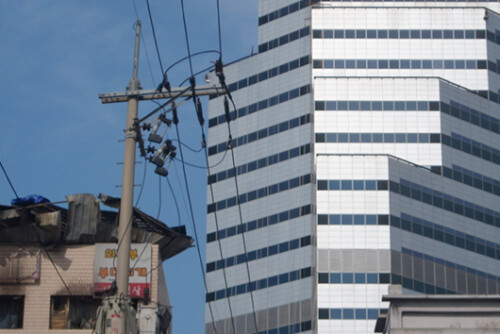Article note. 1
The term “neoliberalism” has come to mark an era. In its initial instantiations, this term described a critique of a set of economic policies that included privatization and lowering tariffs pertaining to imports and exports of raw materials and retail goods. The latter set of policies, also known as “free trade” agreements, drove much of the critical literature on neoliberalism throughout the 1990s and into the 2000s. Twenty years after the adoption of these policies, the context of the end of the Cold War and the possibility of globalizing Bretton-Woods-style economic policies, thereby rendering “global” advanced capitalism, have faded in critiques that incorporate the terminology of “neoliberalism” and “globalization.” Rather, these are now deployed as periodizing terms, rather than as terms that signify an economic and political context that structures lives and livelihoods. As anthropologist Vinay Gidwani writes regarding the idea of “globalization” in India:
“Globalization” is an amorphous process with many, and deeply uneven, geographies. This is not news. What is newsworthy is how visceral the inequities are across regions and within cities in countries like India. Notwithstanding the giddy (and sometimes alarmist) proclamations of India’s arrival on the world stage as an economic superpower—stand up, Thomas Friedman!—it is apparent to anyone who cares to scratch the surface of this rhetoric that economic globalization in India has directly benefited only a small slice of the urban population. 2
Whereas economic globalization has benefited a slice of India’s urban elites, poor people who are migrating to cities like Mumbai are members of the legions whom “globalization” has dispossessed. My work has focused on a subsection of these migrants, women who have come from rural areas and attempt to survive through Mumbai’s day-wage labor markets, or those who have passed through these markets as construction workers, and now earn mainly through sexual commerce. I have attempted to address the shift in the uses of “neoliberalism” by marking specific legal or policy contexts that may be described as “neoliberal,” such as the lowering of tariffs, or, more often, the growing lack of access to legal migration for poor workers, as international borders have become relatively more militarized, more open to the flow of capital, and much more closed to the flow of people.
“Globalization,” Prostitution, and Migration
Much of the present reality of prostitution is connected to the politics of global migration mainly because prostitution in general, and especially in the global South, involves some element of movement from place of origin. At the same time, an NGO-sector devoted to rescuing women from prostitution has grown exponentially since the twin policies of privatization and lowering tariffs were adopted in India in the early 1990s. These organizations have identified migrancy and “porous borders” as the key factors that encourage trafficking. According to this logic, a readily available solution to trafficking is to increase border controls further, and to limit the level of cross-border migration available to people seeking work.
The links between migration and economic survival for people living in poverty in India occurs against the backdrop of depleted water tables, drought-plagued arable land, and rural displacement. Such regions now supply the lion’s share of economic migrants to the world’s economies. Agricultural labor has generally been the main mode of survival in these areas, but this is also less and less sustainable, as food security decreases with the increased consolidation of corporatized food production, seed patenting, and decreased farm subsidies. There is a clear double standard at work in easing barriers to the migration of capital through decreased tariffs on foreign investment and international agreements like NAFTA, while increasing the barriers to cross-border migration, affecting especially landless economic migrants. This double standard has affected the sex industry by limiting access to travel for cross-border migrants, while simultaneously improving the market for trafficking in persons by making cross-border migration more legally difficult.
The New “Neoliberalism”
The lived consequences of the idea that “neoliberalism” is a period and, indeed, an ethos, have included increased police sweeps, brothel raids, and displacement for sex workers throughout cities in the global South. Discourses on human trafficking that have focused on sexual exploitation and prostitution, to be sure, have had a vexed relationship with the question of poverty. While prostitution was often related to economic vulnerability and the lack of economic power among the women who have formed the core research population of my own work, discourses on human trafficking have tended to conflate poverty with a generalized lack of agency, such that poverty also becomes inextricable, and, in some representations, co-equal with trafficking itself. I would argue that this rendering of poverty only becomes possible when “neoliberalism” ceases to be understood in economic terms. In the current hegemonic understanding of “trafficking-as-prostitution,” conflating human trafficking with poverty has tended to render “poverty” itself as an agent of trafficking. If poverty essentially “traffics” human beings into underground economic sectors, including prostitution, then poor people are necessarily rendered as non-agentive beings with respect to the illegal and underground strategies for economic survival they may engage in. Two examples of this perspective on poverty in its relationship to trafficking are the Swedish government’s 2003 report entitled Poverty and Trafficking in Human Beings: A Strategy for Combating Trafficking in Human Beings Through Swedish International Development Cooperation, 3 and a 2006 article by Sarah Gonzales, published on the Captive Daughters website, entitled “Poverty and Sex Trafficking: How will Warren Buffett’s $30.7 billion donation to The Bill & Melinda Gates Foundation, earmarked to fight poverty, affect global sex trafficking, the cause of which is rooted in poverty?” 4 In the Swedish government’s report, poverty and trafficking are linked because “[p]eople become the victims of human traffickers mainly due to inequitable resource allocation and the absence of viable sources of income. Families have no assets and incomes are inadequate. In the countryside, agriculture is less profitable than formerly and land has become increasingly scarce.” 5 Similarly, according to the article by Gonzales:
What we do know is that poverty drives sex trafficking, and that sex trafficking as the delivery system for prostitution means that each day scores of young, poor women and girls will turn to sex trafficking and prostitution as a means to […] provide for themselves, and for their families, because they have no other choice. The hope is that funds earmarked for fighting poverty will eventually fight sex trafficking, too, putting an end to this exploitative practice by offering viable economic options for poverty-stricken women and girls in developing nations who want to work. 6
Both of these relatively emblematic antitrafficking perspectives are rooted in a legal and policy orientation which emphasizes combating “exploitation.” The concern with exploitation is at the heart of debates and definitions of trafficking. Both of the perspectives excerpted above were generated in relation to the UN “Protocol to Prevent, Suppress and Punish Trafficking in Persons, Especially Women and Children.” The final protocol definition of trafficking was the result of much debate and disagreement between groups about the difference between trafficking and prostitution. The definition bears mentioning here, as it outlines the parameters through which juridical debates on trafficking, prostitution, and poverty are ostensibly framed. The definition reads:
“Trafficking in persons” shall mean the recruitment, transportation, transfer, harbouring or receipt of persons, by means of the threat or use of force or other forms of coercion, of abduction, of fraud, of deception, of the abuse of power or of a position of vulnerability or of the giving or receiving of payments or benefits to achieve the consent of a person having control over another person, for the purpose of exploitation. Exploitation shall include, at a minimum, the exploitation of the prostitution of others or other forms of sexual exploitation, forced labour or services, slavery or practices similar to slavery, servitude or the removal of organs. 7
The discourse that seems to be emerging among various governmental and nongovernmental actors concerned with the issue of trafficking is one in which poverty, exploitation, and trafficking are theorized in relation to each other in the relative absence of a discussion about class or the effects of bilateral and regional trade agreements in the global South.
The Way Forward?
For sex worker activists, an emphasis on prostitution as a livelihood and as structured by economic contexts that include economic migration has been critical to countering the idea that sex work is essentially a matter of violence. This emphasis has included a focus on migration in particular, because migration interpolates the abstract ideal of economic survival with individual subjects’ engagements with physical movement and the conditions for the transition, in most cases, from rural to urban life. Some scholars of migration and immigration have argued that the industrialization of antitrafficking efforts is directly linked with the need to preserve the mythical integrity of international borders, and that these efforts are also linked with the need to secure a base of cheap labor in countries within the global South. This moment of global economic recession necessitates elaborating and specifying these critiques and strategies, as nationalist discourses of migrant labor “invasions” become more pronounced in Europe and the United States, and as rural to urban domestic migration throughout the global South increases exponentially.
- This piece is an agglomeration of passages on neoliberalism published in several works by the author over the past decade, including: Svati P. Shah, “Distinguishing Poverty and Trafficking: Lessons from Field Research in Mumbai,” Georgetown Journal on Poverty Law & Policy 14 (2007); “Sex and Work: An Overview of the Debate on the Selling of Sexual Services in a Globalized Economy,” New Labor Forum 12.1(2003): 76-83; and, Street Corner Secrets: Sex, Work and Migration in Mumbai’s Informal Sectors, (Durham: Duke U P, forthcoming 2014).[↑]
- Vinay K. Gidwani, “Subaltern Cosmopolitanism as Politics,” Antipode 38 (2006): 12.[↑]
- Swedish Department for Global Development, Poverty and Trafficking In Human Beings: A Strategy For Combating Trafficking In Human Beings Through Swedish International Development Cooperation, (Stockholm: Swedish Department for Global Development, 2003). Available at http://www.sweden.gov.se/sb/d/574/a/20262, accessed 20 May 2013.[↑]
- Sarah M. Gonzales, “Poverty And Sex Trafficking: How Will Warren Buffett’s $ 30.7 Billion Donation to The Bill & Melinda Gates Foundation, Earmarked to Fight Poverty, Affect Global Sex Trafficking,
The Cause Of Which Is Rooted In Poverty?,” Captive Daughters Media 4 (2006). Available at http://freelola.wikispaces.com/file/view/poverty_pgnum.pdf, accessed on 20 May 2013.[↑] - Swedish Department for Global Development 2013.[↑]
- Gonzales 2006.[↑]
- U.N. Office on Drugs and Crime, Protocol to Prevent, Suppress and Punish Trafficking in Persons, Especially Women and Children (Summary), (New York: U.N. Office on Drugs and Crime, n.d.). http://www.unodc.org/unodc/trafficking_convention.html, accessed 20 May 2013.[↑]



